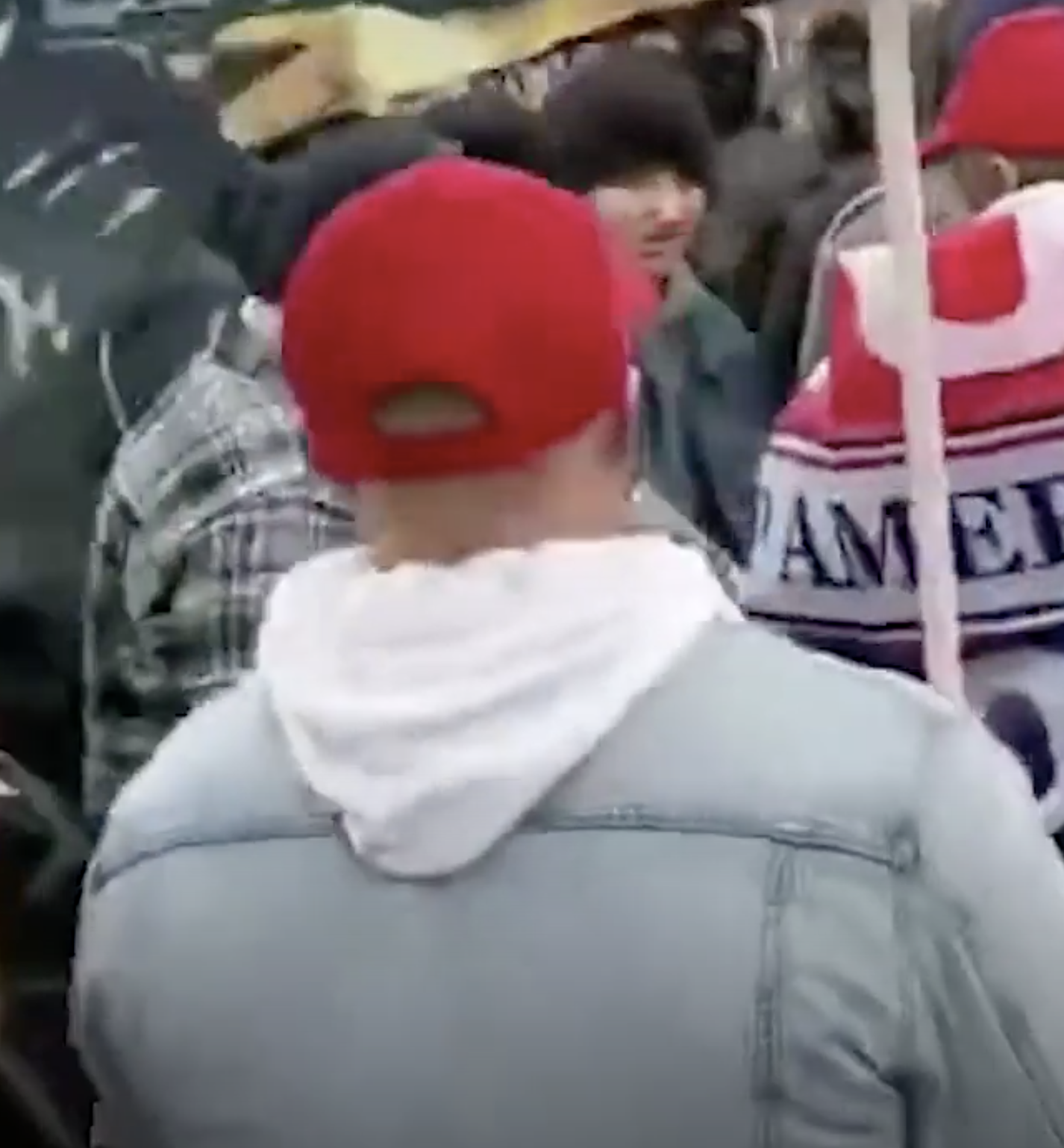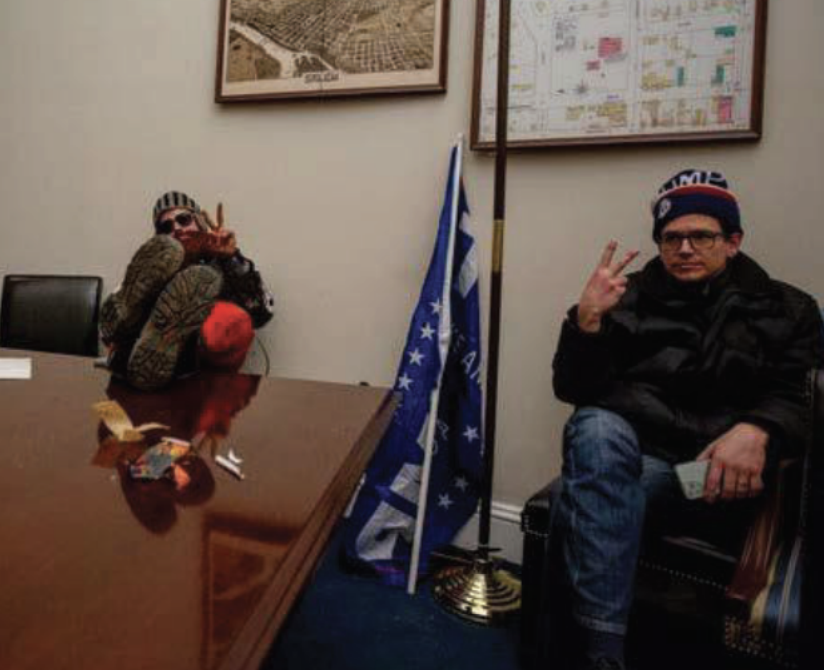In a bond hearing yesterday, January 6er Brandon Fellows explained that he was on a mountain where he went to pray when the FBI came looking for him, but then his bus (in which he lived at the time) got stuck in a ditch. True or not, the claim is an apt metaphor for Fellows, who seems to be little more than a big-Trump narcissist stuck in a little-Trump life.
Fellows kept repeating a number of phrases to blame others for his woes in the hearing. “Not to throw anyone under a bus,” he’d say as he introduced some new claim about someone — all women as far as I could tell — who did him wrong. “It’s unfair,” he said over and over, as he offered some implausible excuse for why he was unable to meet release conditions that hundreds of other January 6 defendants, to say nothing of those prosecuted at disparate rates, could manage. He has made, “constant improvement,” in compliance with his release conditions he claimed, describing that by the time bail was revoked he was breaking fewer requirements at a lesser rate. He responds better to “positive reinforcement.”
Part way into the hearing, he even introduced that observation by citing what Fellows vaguely remembered was an article on Canada’s positive policing approach, and said he thought the US should adopt that approach. “I respond a lot more positively to positive reinforcement.”
He surely didn’t know it, but he was effectively adopting the goals of the Defund the Police movement, which he had seemed to attack in a partisan screed with which he launched his statements and returned to during his close. “January 6 has been a gaslighting tool by the opposition,” he said of an Administration supported by both the Electoral College and Popular Majority, though the claim seemed to arise from a belief there are two tribes in the US locked in combat. “I’m not like the Taliban and neither are other January 6ers.” He almost immediately moved on to ask to be treated like people sent to Gitmo since, he claimed, Joe Biden had freed all of them.
Along the way, though, Fellows admitted to virtually all the allegations that got his bail revoked. “Yeah, I did question [the pretrial service officers] rudely, are your hormones okay, disrespectfully,” he admitted. Yeah, he did call the mother of his pretrial services officer rather than the probation office.
Yes, he did indeed contact the wife of a judge presiding over a New York State case. He explained he was told there was a “loophole,” such that if a defendant had contact with a judge’s family, the judge had to recuse, resulting in a new judge taking the case. Fellows not only admitted doing that in New York, but he admitted he had proposed doing the same with Judge McFadden, only to have his then defense attorney, Cara Halverson, tell him that would get him arrested. “You did not find a loophole, Brandon,” Fellows relayed what had been a privileged discussion,”I promise you, if you do this with Judge McFadden, you will be arrested.”
Sure enough, when McFadden announced his decision denying Fellows’ motion, the Trump appointee observed that it sounded like Fellows had obstructed justice in New York and had considered doing so in DC to disqualify him, McFadden.
After admitting to trying to game the process to pick his own judges, Fellows made a bigger mistake. He claimed, first, that he had a Tik Tok video proving — and later claimed there must be CCTV video not yet turned over to him showing — that a police officer had told him it was okay to enter the Capitol, so long as he “stopped at the statues.” In doing so, Fellows predictably opened himself to cross-examination about his actions on January 6.
On cross-examination, Mona Furst started and ended by getting him to accede that he had, in fact, committed the violations that had gotten his bail revoked, though most times, Fellows claimed that, “you’re missing lots of context” (citing things like his attempt to test the judge loophole and his inoperational phone), claiming that Furst was “lying by omission” every time she didn’t include his excuses for his own actions. After getting him to concede to virtually all the allegations that had gotten his bail revoked, Furst then turned to his claims he made about his arrest and the riot itself. The lawyer whose advice he claimed he followed when he wrapped his phone in tinfoil and put it on a candy rack next to the Kit Kats, was someone whose name he didn’t remember, who claimed to be a Constitutional lawyer and who had a radio show, his conversations with whom were filmed by a French film crew. Furst asked about his claimed jailhouse interactions with Zach Alam (the guy who broke the window through which Ashli Babbitt jumped) and whether Fellows was, in fact, claiming that Alam was Antifa. Furst got the name of Tighe Berry on the record, so she could compare Fellows’ claims about Berry’s serial Code Pink protests with the actual record.
Then Furst drilled down on Fellows’ claim that a cop told him he could enter the Capitol, so long as he didn’t go past the statues. After getting Fellows to describe precisely where he remembered that conversation happened, she then asked who told Fellows it was okay to climb into the Capitol through a broken window. Fellows responded by saying a longer camera angle would prove he was worried about going in. “What officer told you it was okay to climb in a broken window,” Furst persisted in response.
Furst closed her cross-examination by getting Fellows to, again, concede that the reason his bail had been revoked was that he missed a mental health appointment.
It was even worse than all that. Check out my live tweet for details of how Fellows attempted to call his former defense attorney, Halverson, to attest to his wishes to provide more of the excuses that he had in this hearing. Fellows made up some conspiracy theory about the CIPA filing he is getting, claiming that a National Security Advisor (really, an AUSA) was secretly charging him; McFadden assured Fellows that he had not gotten additional secret charges. Fellows admitted he cried when he got his GPS bracelet put on. He explained, “I smile because I don’t like to show my weaknesses.”
Predictably, Fellows even admitted that he thought it was a stupid decision to go pro se, but he felt at the time it would offer a way to get out of jail.
I did not want to go pro se. I feel like it was a stupid decision. I felt like I had to get out. A lot of ill treatment in jail [from people] who are not Jan 6ers. I would like opportunity to show the court, positive reinforcement, that I can follow the rules.
It was a stupid decision.
McFadden confirmed Furst’s contention that he had given Fellows this hearing even though he was not legally entitled to it, but that he had been permitted to do what, on afterthought, he had wanted to do earlier, testify. McFadden predictably denied Fellows’ motion to reconsider the bail determination, and established a record to note that he has detained defendants — naming Timothy Hale-Cusanelli — who (like Fellows) did not engage in violence on January 6. He described having given Fellows three chances to avoid jailing, which (McFadden claimed) he had never done before. Most importantly, McFadden mocked Fellows’ expressed preference for “positive reinforcement” and judged that Fellows had shown “contempt” to the criminal justice system and the court.
I understand it would have been nicer to get positive reinforcement. This is not community college. You’re facing serious felonies.
[snip]
You engaged in pattern that shows contempt to criminal justice system, to the court. I have no confidence you would follow my orders.
McFadden went on to opine that, in fact Fellows probably had obstructed justice in New York and considered doing so in this case.
The performance of Brandon Fellows yesterday exhibited every single one of Donald Trump’s worst traits. Consistently, he has tried to con his way both into and out of problems. When his own actions were described to be illegal or improper, he claimed it was fake news, and attacked others for failing to present his preferred “context.” And ultimately, he believed that if he could just tell his story himself, he’d be able to con his audience that he was just unfairly accused.
While McFadden has recognized how the January 6 attack has delegitimized democracy, he has also expressed a good deal of skepticism about the equity of the treatment of defendants as compared to other rioters. As he noted, he gave Fellows three chances to fuck up.
But McFadden also takes the authority of the court very, very seriously. And Brandon Fellows just made a mockery of it. This was an instance where McFadden saw, in his courtroom, how much bullshit is flying about January 6 and the aftermath.



